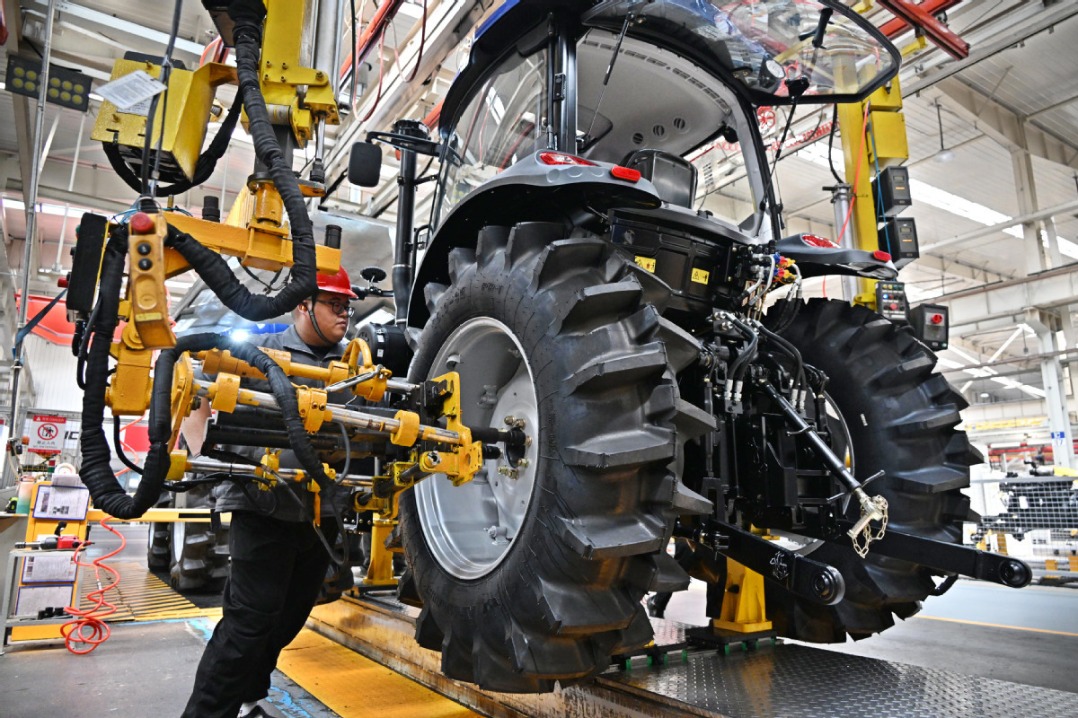Fool's errand


WANG XIAOYING/CHINA DAILY
'Overcapacity' claims target China's green industries which are producing exactly what the world wants and needs
Editor's note: The world has undergone many changes and shocks in recent years. Enhanced dialogue between scholars from China and overseas is needed to build mutual understanding on many problems the world faces. For this purpose, the China Watch Institute of China Daily and the National Institute for Global Strategy, Chinese Academy of Social Sciences, jointly present this special column: The Global Strategy Dialogue, in which experts from China and abroad will offer insightful views, analysis and fresh perspectives on long-term strategic issues of global importance.
In March, I visited Wuwei in Gansu province. I had to keep pinching myself. There were solar panels covering the desert with only the horizon interrupting my view. China Three Gorges Corporation and the Elion Resources Group of Inner Mongolia, the companies that have established the solar farm, have also developed a lot of wind energy.
I may be naive, but I thought this was exactly what the world desires. Massive investments in renewable energies, bringing down the price, and scaling green energies to new heights to enable China to achieve its carbon peak target well ahead of the 2030 deadline.
The visit of United States Treasury Secretary Janet Yellen to Beijing around the same time, prompted me to think differently. From the US' perspective, the massive Chinese roll out of green technologies is not an enormous service to the world, but instead a problem. In Yellen's view, China has overcapacity in the green sector.
But how can that be a problem?
I recall vividly when we left the climate talks in Copenhagen in 2009, some environmentalists were desperate, they saw almost no solution. Yes, former US president Barack Obama was there with then Chinese premier Wen Jiabao, along with German chancellor Angela Merkel, prime minister Manmohan Singh of India and Brazilian President Luiz Inacio Lula da Silva. But the outcomes were meager.
What no one contemplated departing from Copenhagen was that the price of solar energy would fall almost 80 percent and that of offshore wind energy by almost 70 percent in the next decade. This is largely, but, for sure, not solely, thanks to China. I thought this was what we all dreamed of. Some governments, including the Joe Biden administration, have argued that we need a green shift in production and that it has to be innovative, at scale and cheap.
The argument about "overcapacity" is against common sense. Interestingly it is also contrary to all economic theories, starting from Adam Smith. My nation, Norway, has huge "overcapacity" in oil and in fish. We sell a lot more oil than we can consume at home and we catch a lot more cod and salmon than we can eat ourselves. That "overcapacity" makes it possible for us to buy cellular phones from the US, wine from France and electric cars from China.
No nation in modern history has benefited more from overcapacity than the US. In the middle of the 20th century, the US accounted for nearly half the global economy. The nation had overcapacity in nearly all sectors and it made the US very strong. Today Silicon Valley has an enormous overcapacity in digital products. If Silicon Valley only produced for California or for the US, no one would ever have heard of that little valley.
China is now dominant in nearly all green sectors. The nation accounts for 60 percent or more of the solar, wind and hydro technologies produced today, as well as electric cars and batteries. China is the indispensible nation for the green shift. It is possible to go green without China, but it will be a lot more expensive and thus much slower.
The West should get up early in the morning and respond to China's lead by pursuing innovation and green competition. Protectionism is a race to the bottom. Green competition is a race to the top.
China invited Tesla to make its gigafactory in Shanghai, to bring a "catfish" into the Chinese electric vehicle market. It forced many smaller Chinese competitors to swim faster. It worked, and BYD, Geely, Xpeng, Nio and many others are now strong contenders. Tech companies such as Huawei and Xiaomi are also joining the contest.
The West should similarly invite BYD and CATL, LONGi and Tongwei, Goldwind and Envision to invest in Europe and America. That may tempt Western companies to run faster.
Last year I visited CATL. It is located in the small town of Ningde in Fujian province. It is the world's leading electric battery maker, providing batteries to Tesla and many others. CATL was full of praise for Germany's BMW who they repeatedly said had helped them off the ground, by being a demanding customer and sharing technology and expertise.
Such partnerships can be replicated, only with Chinese companies in the lead.
It takes two to tango. The West needs to respond constructively to the competition from China. China can also help this process, through dialogue and partnerships.
Of course all nations want jobs in their own country. Prime Minister Narendra Modi has launched his "Make in India" strategy. French President Emmanuel Mac ron is concerned about jobs in France, and German Chancellor Olaf Scholz with the future of the German car industry. It is highly unlikely that China will be able just to export green products from home. Chinese companies will be called upon to create jobs in Europe and America, in Africa and Asia. It's great to see BYD investing in Brazil, CATL in Hungary and LONGi in Vietnam. We need a lot more of this.
China should also look favorably into companies complaining about a level playing field in the Chinese market. There is for instance hardly any outside wind power equipment makers left in China. Maybe they are not able to compete? But a dialogue to assure there is fair mutual access to markets, will calm the skeptics.
China was also responsible for 38 percent of the total global clean tech spending in 2023, investing an impressive $676 billion. Last year, China invested $890 billion in clean energy sectors and it added 300 gigawatt of solar and wind energy to the grid, that is 10 times the total hydro production in Norway which keeps all its inhabitants warm in winter, with plenty of electricity available for any demand.
Chinese "overcapacity" in green sectors should be admired, not criticized. But there should be a profound dialogue to make sure all nations benefit.
The author is vice-president of the Green Belt and Road Coalition and former executive director of the United Nations Environment Programme. The author contributed this article to China Watch, a think tank powered by China Daily. The views do not necessarily reflect those of China Daily.
Contact the editor at editor@chinawatch.cn.
































